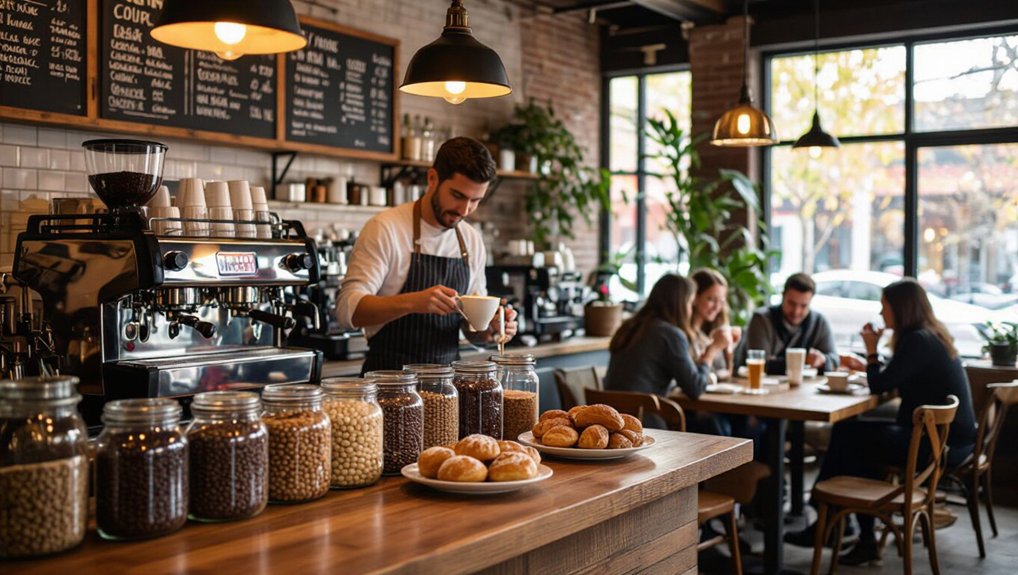Wondering how to turn your coffee obsession into a profitable business venture? Starting a coffee shop might seem like a dream come true for caffeine enthusiasts, but many aspiring entrepreneurs quickly discover it’s far more challenging than expected. Beyond brewing the perfect cup, you’ll face hurdles like securing funding, finding the right location, navigating permits, and building a customer base in an increasingly competitive market.
The good news is that with proper planning and strategic execution, your coffee shop can become a thriving community hub. This comprehensive guide will walk you through the essential first steps to launch your coffee business successfully. You’ll discover how to conduct market research, create a solid business plan, choose the perfect location, and handle the legal requirements that many new owners overlook.
By the end of this post, you’ll have a clear roadmap for transforming your coffee shop vision into reality, complete with actionable steps and insider tips to help you avoid common pitfalls that derail many new coffee businesses.
Table of Contents
Market Research and Local Coffee Landscape
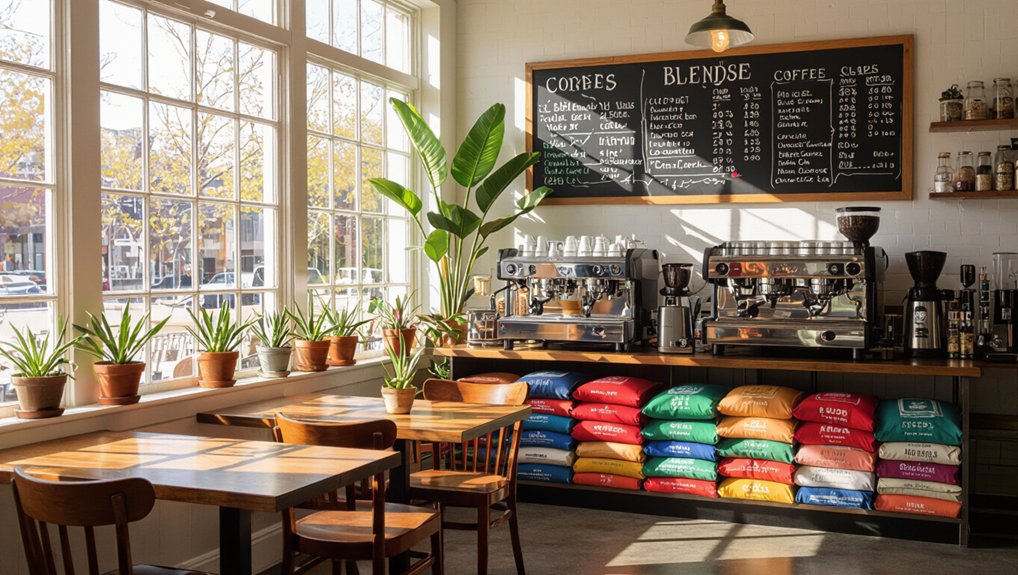
Before diving into the exciting world of coffee shop ownership, you’ll want to lay a solid foundation through comprehensive market research.
Comprehension of the local coffee landscape is crucial to identifying unique opportunities. By analyzing competitor strengths, customer demographics, and industry trends, you’ll discover potential gaps in the market.
Location analysis becomes your strategic roadmap. You’ll want to evaluate foot traffic, neighborhood characteristics, and existing coffee shops.
Dive deep into customer feedback and menu development strategies that can set you apart. Your goal? Differentiation in a projected $237.6 billion coffee shop industry.
Crafting a Compelling Business Plan

After mapping out the local coffee landscape, you’ll want to crystallize your vision into a robust business plan. This strategic document will outline your coffee shop concept, target market, and unique selling proposition.
| Component | Key Considerations |
|---|---|
| Market Analysis | Demographics, trends |
| Financial Projections | Startup costs, expenses |
| Management Structure | Team roles, partnerships |
| Growth Milestones | Quarterly/annual objectives |
Business plan templates can guide you in developing comprehensive sections that showcase your comprehension of the market. Focus on financial projections and operating expenses to demonstrate your coffee shop’s potential viability to investors. Your plan isn’t just paperwork-it’s a roadmap to caffeinated success.
Financial Planning and Startup Costs
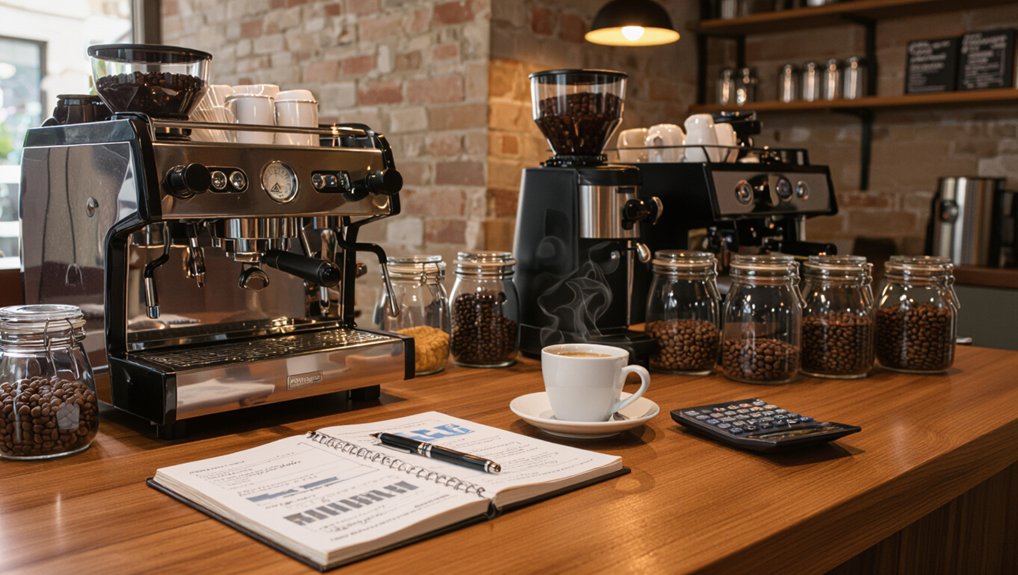
While launching a coffee shop represents an exciting entrepreneurial journey, grasp of the financial landscape is critical for transforming your dream into a sustainable business.
Financial planning starts with awareness of startup costs, which range from $60,000 for a kiosk to $300,000 for a full-service café. Your solid business plan should outline essential expenses like coffee shop equipment, inventory management, real estate expenses, and marketing budgets.
I recommend allocating funds carefully across operating costs, necessary licenses and permits, and maintaining robust cash flow. Strategic budgeting ensures you’re prepared for initial investments and ongoing operational challenges.
Location Selection and Site Analysis
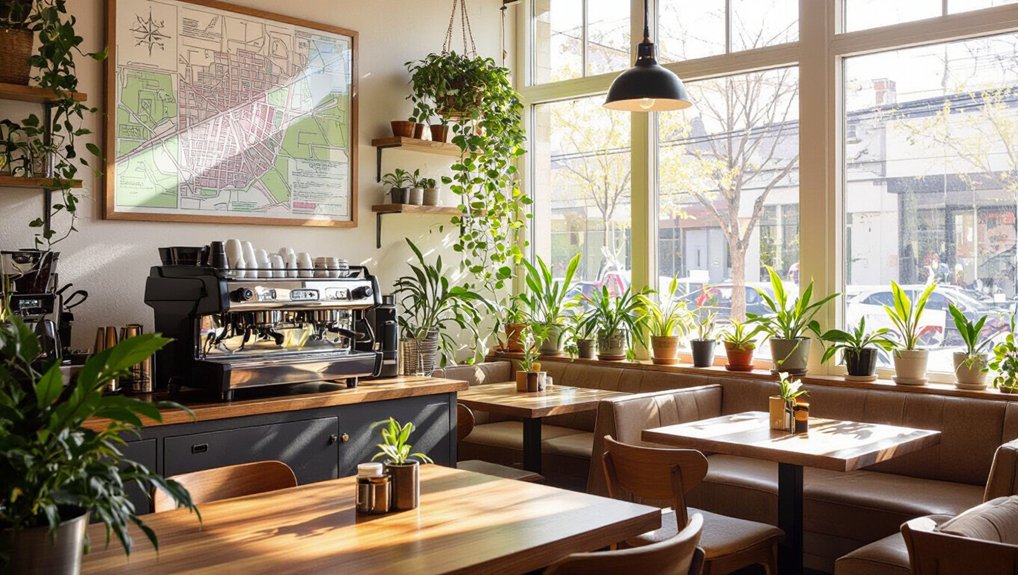
Since choosing the right location can make or break your coffee shop’s success, I’ll guide you through a strategic site selection process that transforms your café dreams into a thriving reality.
Location selection involves critical considerations:
- Analyze foot traffic and visibility to ensure consistent customer flow.
- Evaluate competitor locations and neighborhood demographics.
- Calculate rent costs against projected profitability.
- Conduct comprehensive site analysis for operational needs.
Your chosen space must balance customer experience with practical requirements.
Menu Development and Coffee Sourcing
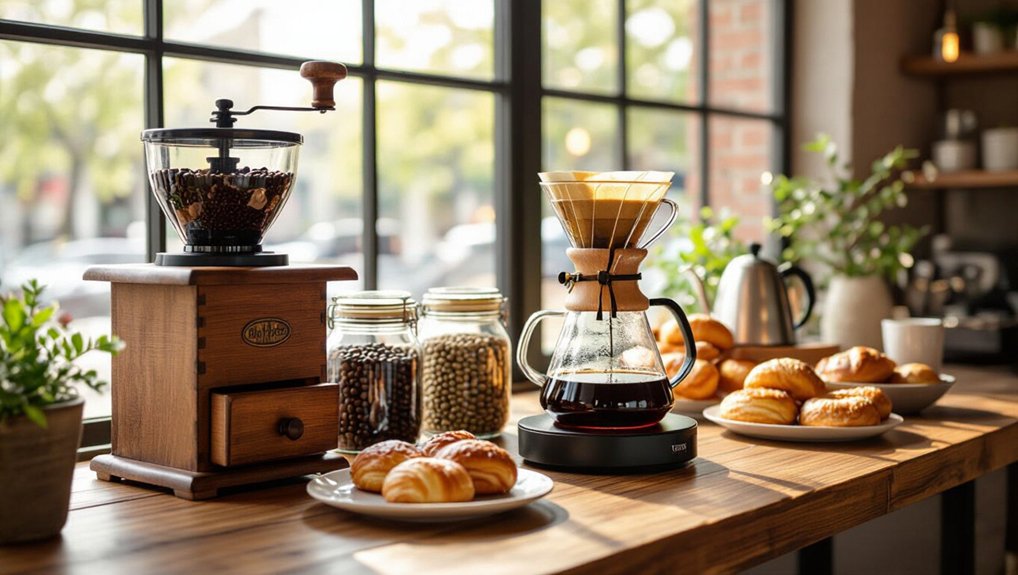
Crafting a standout coffee shop menu requires more than just brewing great coffee-it’s about creating an experience that resonates with your target customers.
Through careful market research, I’ve learned that menu development isn’t just about listing drinks, but comprehending customer preferences and coffee trends. Sourcing high-quality coffee beans from reputable suppliers becomes crucial, as each sip tells a story of craftsmanship.
I recommend focusing on specialty drinks that showcase unique flavors while maintaining a curated selection. Seasonal offerings and limited-time creations keep the menu exciting, and regularly collecting customer feedback ensures your coffee shop stays innovative and responsive to what people truly want.
Design and Layout Strategy
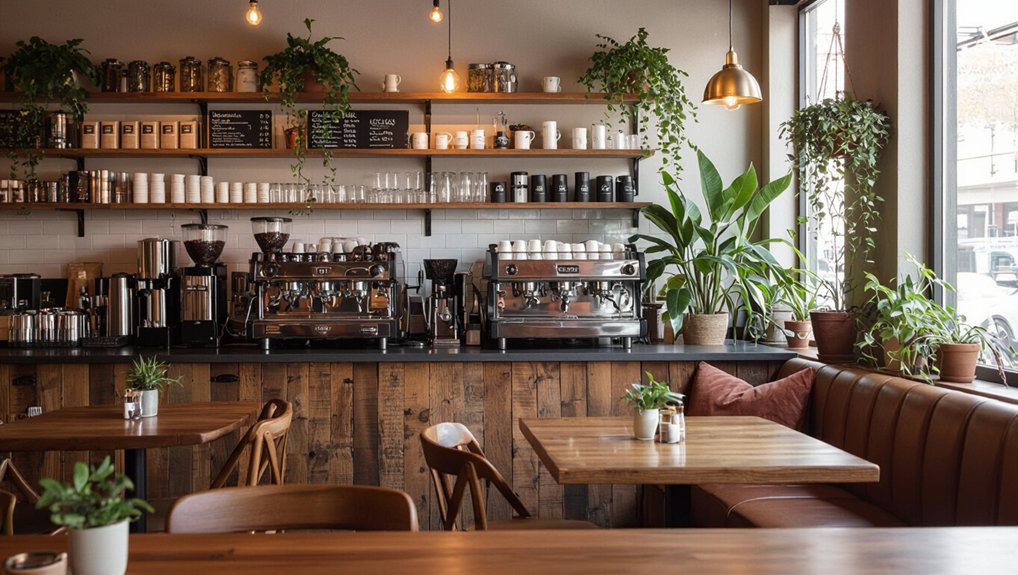
Because successful coffee shops are as much about ambiance as they’re about great coffee, your design and layout strategy becomes a critical component of your business’s overall appeal.
Your coffee shop layout should prioritize:
- Operational efficiency with minimal barista movement
- Welcoming atmosphere through strategic lighting and color
- Comfortable seating that supports customer flow
- High visibility and accessibility for easy navigation
Design inspiration comes from studying competitors while maintaining a unique vision.
Equipment and Supply Procurement
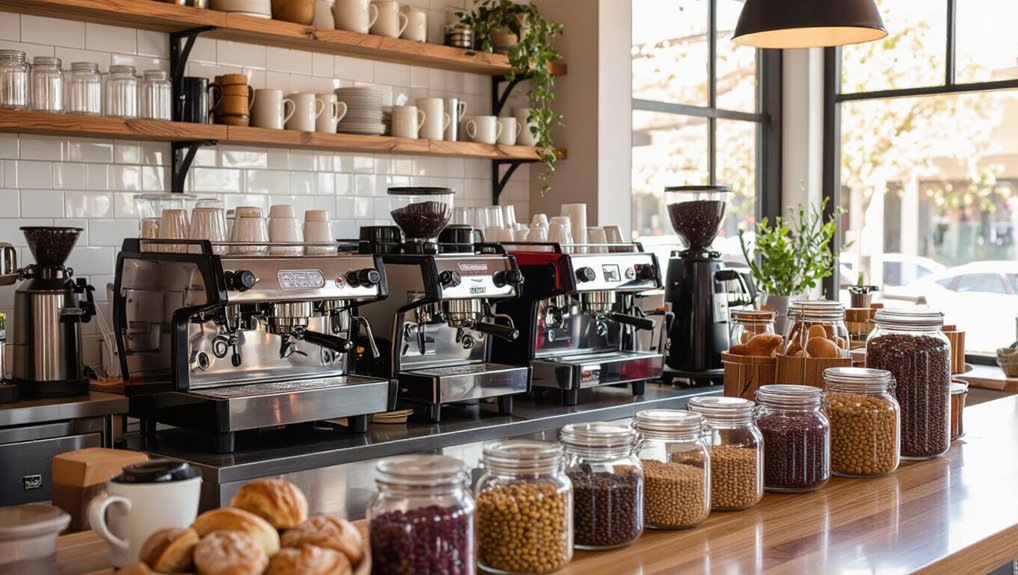
After meticulously designing your coffee shop’s layout, the next critical step involves selecting the right equipment and supplies that will transform your vision into a thriving business. I’ll invest in commercial-grade espresso machines and quality brewing equipment, realizing that this foundation directly impacts profitability.
| Equipment | Estimated Cost |
|---|---|
| Espresso Machines | $15,000-$25,000 |
| Coffee Grinders | $2,000-$5,000 |
| POS System | $1,500-$3,000 |
Establishing relationships with reliable coffee bean suppliers ensures consistent quality. I’ll implement robust inventory management through a comprehensive POS system, tracking supplies and maintenance costs. Strategic procurement means comparing vendor prices and prioritizing equipment that supports my shop’s unique brand identity.
Staffing and Team Building
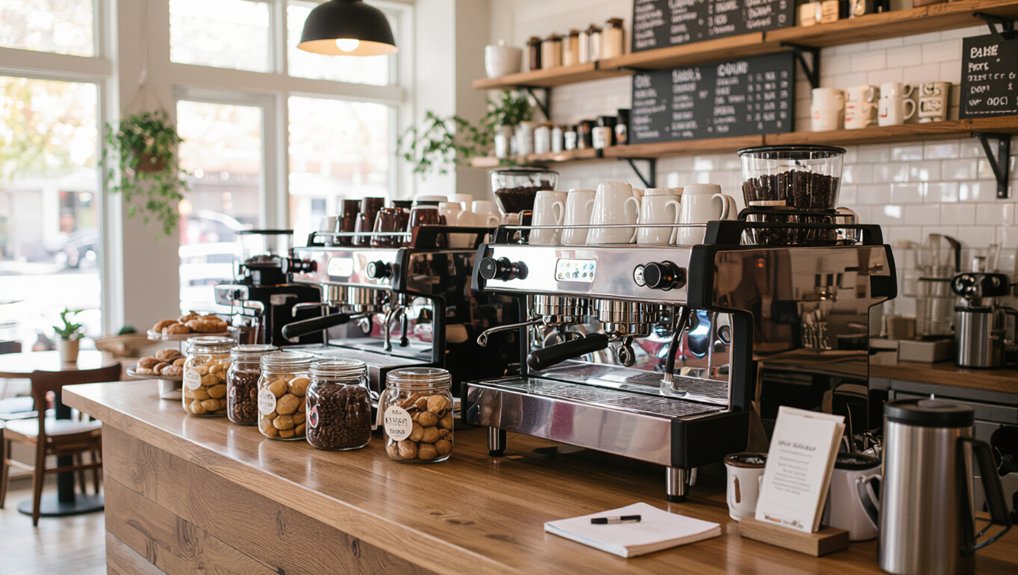
While launching a coffee shop demands strategic equipment and design, building an exceptional team represents the heartbeat of your business success. Staffing your shop requires careful consideration:
- Recruit baristas with strong customer service skills
- Develop a comprehensive training program
- Foster a supportive work culture
- Implement competitive employee retention strategies
Your team’s quality directly impacts customer loyalty. By prioritizing employee development through regular staff meetings and offering career advancement opportunities, you’ll create a cohesive environment that elevates your coffee shop’s reputation.
Competitive wages and genuine investment in your staff’s growth will transform talented individuals into passionate coffee professionals who’ll help your business thrive.
Branding and Marketing Approach
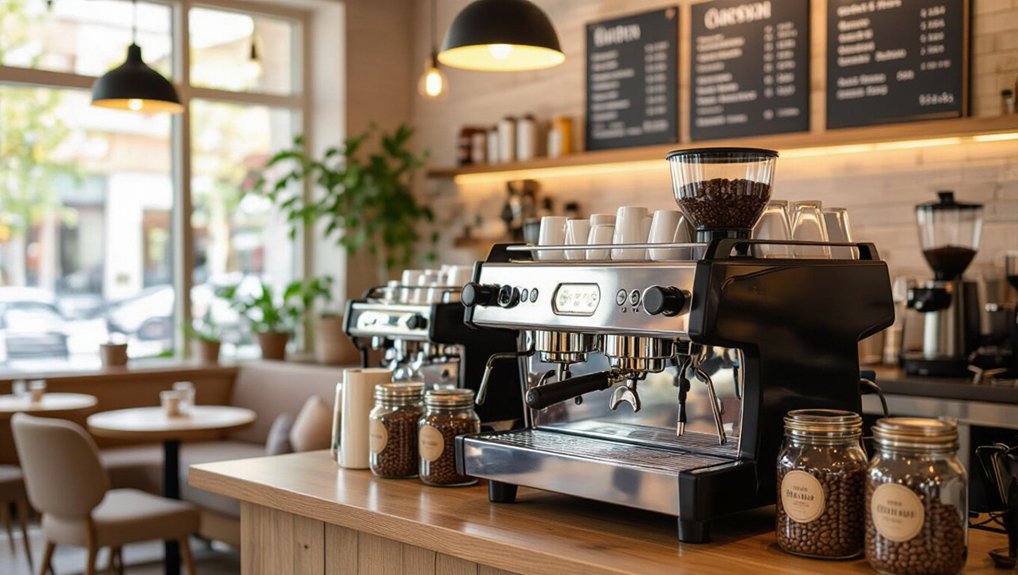
Building a remarkable coffee shop team sets the stage for your brand’s success, but transforming that team’s passion into a compelling market presence requires strategic branding and marketing.
Your brand identity is your first customer touchpoint, so invest in a memorable logo, consistent color palette, and storytelling that creates an emotional connection.
Leverage social media to showcase your unique offerings and engage with your community. Implement a loyalty program to encourage repeat business, and collaborate with local influencers to expand your reach.
These marketing strategies will help you stand out in a competitive coffee landscape.
Legal Requirements and Business Registration
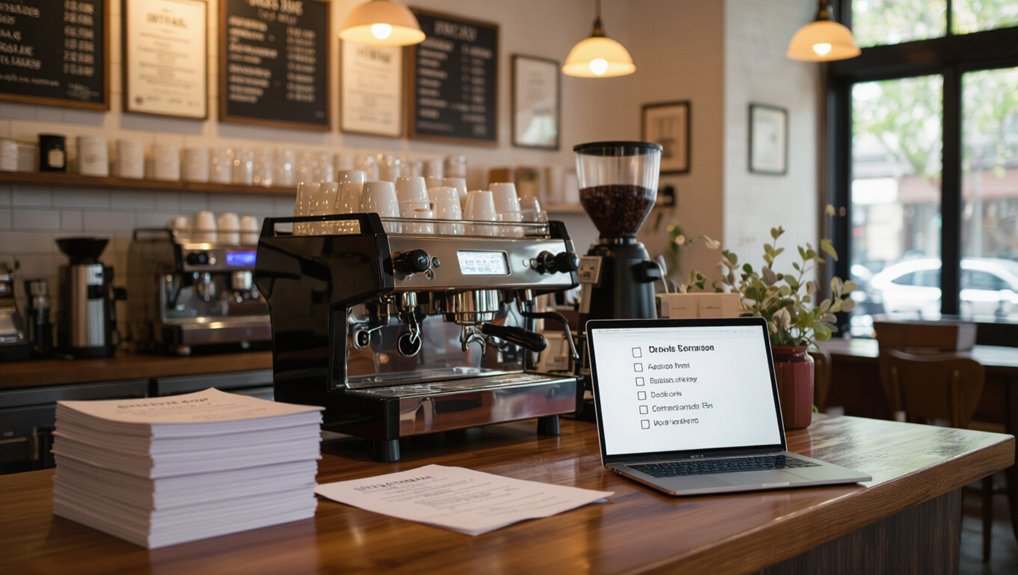
If you’re dreaming of turning your coffee passion into a thriving business, you’ll quickly discover that navigating legal requirements is as crucial as perfecting your espresso technique.
When starting your coffee shop, focus on these key legal steps:
- Choose a business structure (sole proprietorship, LLC, or corporation)
- Obtain essential licenses and permits (business, food service, health)
- Register your business name and consider trademarking
- Ensure full compliance with local health and safety regulations
Consulting legal professionals can help you navigate the complex landscape of business registration, ensuring you’re set up for success from day one.
Each step protects your business and sets a solid foundation for your coffee shop venture.
Frequently Asked Questions
What Is the First Step to Open a Coffee Shop?
I’ll define my coffee shop’s vision and mission first. This foundational step will guide my branding, purchasing decisions, and partnerships, helping me create a unique and purposeful business that stands out in the market.
What to Do Before Opening a Coffee Shop?
I’ll research my market thoroughly, develop a solid business plan, secure necessary permits, scout a high-traffic location, and create a detailed budget covering startup costs. These steps will set a strong foundation for my coffee shop’s success.
How Much Money Should I Have to Start a Coffee Shop?
I’d recommend having $80,000 to $300,000 saved, depending on your shop’s concept. You’ll need funds for real estate, equipment, inventory, and initial operating costs. A detailed business plan will help you determine your exact startup budget.
How to Start a Coffee Shop With No Experience?
I’ll learn the coffee business through online courses, internships, and working at established cafés. By gaining hands-on experience, networking with industry professionals, and studying successful coffee shop models, I’ll build my knowledge and confidence to launch my own venture.
In Conclusion
Starting a coffee shop isn’t just a dream-it’s a journey of passion, strategy, and dedication. I’ve walked you through the essential steps, from market research to branding, that’ll transform your caffeine-fueled vision into reality. Remember, success isn’t about perfection, but continuous learning and adapting. With careful planning, quality coffee, and genuine connection to your community, you’ll create more than a business-you’ll craft a beloved local gathering spot that serves up warmth, one cup at a time.

